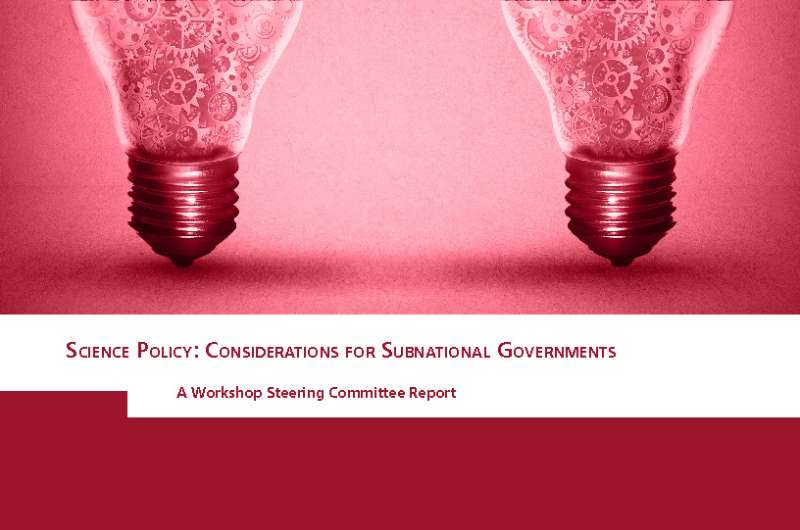Science policy: Considerations for subnational governments

A new report, Science Policy: Considerations for Subnational Governments, released today by the Council of Canadian Academies (CCA), affirms the importance of explicit science policies at the subnational level.
"In Canada, science is as much a provincial endeavour as it is a national one," said Dr. Joy Johnson, FCAHS, Chair of the CCA Workshop Steering Committee, and Vice President of Research at Simon Fraser University. "Currently, the institutions that perform science, together with the infrastructure and funding that enable it, are a part of a multi-level system that is uncoordinated and complex. Realizing the benefits of science as a country requires explicit and effective science policies across all levels of government."
While all governments have implicit science policies, the report emphasizes that explicit science policies help to articulate the value and objectives of support for science, enhance government coordination and alignment, and increase transparency. Making science policy explicit at the subnational level can also aid in leveraging federal support for science.
The report is the outcome of a two-day expert workshop that sought to identify key considerations for science policies relevant to subnational jurisdictions, specifically for Canadian provinces and territories. Among its findings, the report notes that a comprehensive framework for science policy can be built around five core elements: people, infrastructure, research, science culture, and knowledge mobilization. The report also underscores that science and innovation policies are distinct, but inextricably linked, and that cross-sectoral and cross-governmental coordination and cooperation are essential. With science changing rapidly and research activities becoming increasingly globalized, a commitment to science and to flexible, yet consistent, science policy, is important for long-term success.
"This study suggests that a long-term commitment to subnational science policy is important for maintaining and developing the entire science ecosystem," said Dr. Eric M. Meslin, FCAHS, President and CEO of the CCA. "Indeed, with the recent release of Canada's Fundamental Science Review there is now an excellent opportunity for provinces to consider how their own investments in science can be coordinated or aligned with federal priorities for maximum impact."
Requested by the Government of Alberta, the report also pulls out some specific considerations for the province and highlights successful research initiatives such as the Alberta Oil Sands Technology and Research Authority (AOSTRA) and the Alberta Heritage Foundation for Medical Research (AHFMR). Overall, the report is intended to be used by Canadian provinces and territories as a roadmap to guide conversations and inform decision-making about science policies at the subnational level.
More information: www.scienceadvice.ca/en/assess … -science-policy.aspx
Provided by Council of Canadian Academies

















